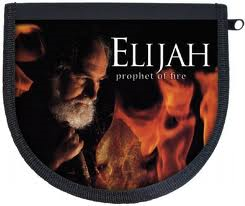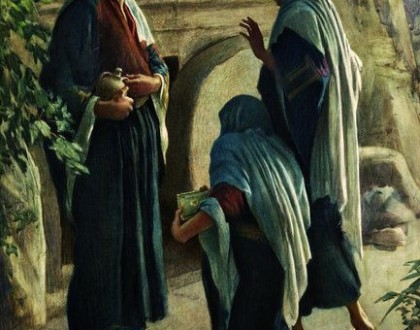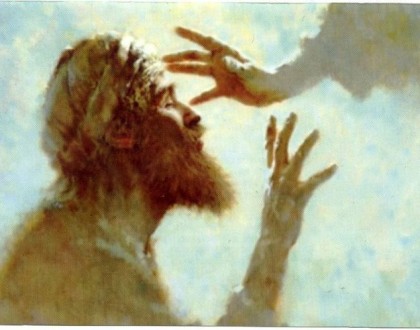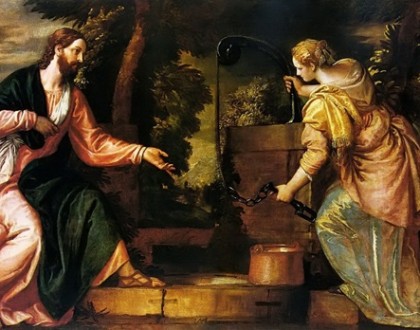Nineteenth Sunday in Ordinary Time, Year B – August 9, 2015

I have always loved reading the Elijah cycle in the Book of Kings. He is a fascinating character. The first book, Chapter 18, portrays Elijah as an invincible prophet who fearlessly stands up to king and prophets, but he remains extremely human also!
Today’s first reading from 1 Kings 19 presents us with the great prophet who is vulnerable and subject to discouragement and fear.
Let us situate today’s story in 1 Kings. In Chapter 19 we have the aftermath of Elijah’s brilliant victory in the contest with Jezebel and the priests of Baal atop Mount Carmel. Just when Elijah should have been triumphant, he receives a message telling him of Jezebel’s murderous intentions, and he is “afraid” (v. 3). Elijah is persecuted for his faithfulness and for demanding total obedience to one God because such loyalty threatens the powers that be who have their own ideas about whom or what people should worship.
Israel’s fiery prophet immediately flees south into the wilderness of the Negev Desert. His mood is one of defeat and desolation. After all he had done for the God of Israel, his victory now seems meaningless. He has not been given the divine protection he was promised and he only wants to die: “It is enough; now, O Lord, take away my life, for I am no better than my ancestors.”There, in the barren desert, Elijah lies down under “a solitary broom tree” and asks God to take his life, claiming that he is no better than his fathers. Elijah bemoans his discouragement at his lack of success in encouraging the Israelites to be faithful.
Energy from above
Suddenly, a messenger (angel) of the Lord awakens him and tells him to eat and drink. Whereas the wicked Jezebel sends a messenger of death to Elijah, the Lord God of Israel sends him a messenger of life, who serves Elijah food and water, two essentials for survival in the harsh wilderness.
Elijah eats, drinks, but then falls asleep again, indicating that he has not yet recovered from his lethargy or depression. The messenger wakes Elijah again and urges him to eat and drink, this time providing a reason, “or the journey will be too much for you” (19:7). This event announces the life giving gift of the Eucharist, given to those especially who lie Elijah don’t have the strength to go on any more.
What can we learn from Elijah in the desert wilderness? Here is a man who has given his life totally in faithfulness to the God of Israel. He has been totally “zealous for the Lord.” His desperate cry, “I am no better than my ancestors” reveals a man who no longer believes in himself. He had believed himself to be a spectacularly exemplary servant of God. No one could outdo him in his zealousness. Now he believes it has been all in vain!
Dark night of the soul
Yet the God of Israel does not give up on Elijah. God’s teaching moment begins when Elijah’s famed resourcefulness runs out. Angels from God are needed to feed him in his weakness. Then God leads him through a time of reflection in the wilderness.
His journeying through Negev wilderness lasts for the significant time of forty days and forty nights. As the Hebrews wandered earlier in the wilderness in search of God, this most zealous prophet and servant of the Lord is led on a similar journey. Eventually Elijah comes to the sacred mountain of Horeb, where he spends the night in a dark cave. The dark cave and the dark night are reflective of his “dark night of the soul.”
Mount Horeb is in some Old Testament traditions the name for Mount Sinai, the mountain associated with God’s appearance. Forty days and nights in connection with Mount Sinai recalls the two sojourns of Moses on Sinai for forty days and nights (Exodus 24:18; 34:28).
The point of this moving story is not just that Elijah makes a physical trip to Mount Horeb or Mount Sinai, but rather something much more significant. In an act of sheer grace God intervenes, provides the prophet with life-giving food and water, and suggests a pilgrimage to mountain that is the place forever associated with the source and essence of Israelite faith.
The Elijah story speaks powerfully to those who are worn-out, fearful, or in need of renewal and recommitment to their original call. The story suggests a way forward — eat and drink of God’s life-giving sustenance, return to the core of faith, listen for God’s still small voice. That may be the way to find new energy, new vision, and a new sense of purpose. Elijah must learn that God is not encountered in the sound and fury of loud and spectacular events. God will not be conjured up by the zealous or boisterous activity of the prophet who now stands quiet and broken atop the Lord’s mountain.
Elijah discovers that God is encountered when the activity ceases and the words stop, when the heart is sad and the stomach is filled with pangs of hunger. When Elijah’s mind and heart are finally empty of ambition and self-promotion, God is ultimately heard.
“If you look at the world you’ll be distressed,
If you look at yourself you’ll be depressed
If you look at Christ you’ll be at rest”
Recent Sermons

Easter Sunday – The Resurrection
April 14, 2017

4th Sunday of Lent Year A – The Man Born Blind
March 27, 2017

3rd Sunday of Lent Year A – The Samaritan Woman at the Well
March 20, 2017





